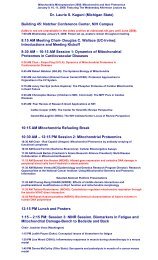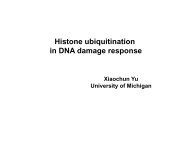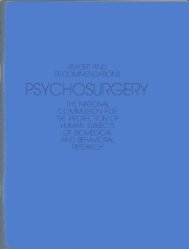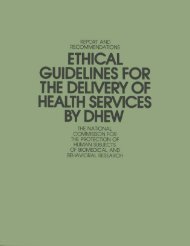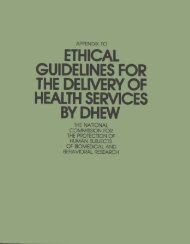RESEARCH ON THE FETUS - National Institutes of Health
RESEARCH ON THE FETUS - National Institutes of Health
RESEARCH ON THE FETUS - National Institutes of Health
Create successful ePaper yourself
Turn your PDF publications into a flip-book with our unique Google optimized e-Paper software.
and assuring safe delivery <strong>of</strong> the fetus. He urged that animal models be used<br />
to the extent possible, even if this would be more expensive and demanding. He<br />
stated that the Government should permit research on the fetus only for the purpose<br />
<strong>of</strong> enhancing the survival or well-being <strong>of</strong> the fetus involved, and only if<br />
it can be conducted in a manner that will respect the rights and dignity <strong>of</strong> the<br />
fetus.<br />
13. Jo Anne Brasel, M.D. (Endocrine Society). Dr. Brasel cited examples<br />
<strong>of</strong> contributions <strong>of</strong> fetal endocrinologic research to fetal welfare and survival.<br />
Continuation <strong>of</strong> research on the fetus was urged to permit study <strong>of</strong> such problems<br />
as hormonal deficiency states and care <strong>of</strong> the fetus <strong>of</strong> the diabetic mother. She<br />
expressed the full support <strong>of</strong> the Society for efforts to see that ethical considerations<br />
are met in the conduct <strong>of</strong> human research, but asserted that the welfare<br />
<strong>of</strong> future mothers and infants would not be served by wholesale interdiction <strong>of</strong><br />
research.<br />
14. Nancy Raymond, R.N. (Public Relations Director, Maryland Action for<br />
Human Life). Ms. Raymond urged that the fetus be treated with fairness and<br />
dignity, whether or not an abortion is anticipated or has been conducted. She<br />
advocated a prohibition <strong>of</strong> research on the fetus, but would make the following<br />
exceptions from such a prohibition: remedial procedures; procedures to study<br />
the fetus within the womb, if they do not substantially jeopardize the fetus and<br />
it is not a candidate for planned abortion; diagnostic procedures that do not<br />
substantially jeopardize the fetus, even if it is a candidate for planned abortion;<br />
and diagnostic procedures that are judged to be in the best interest <strong>of</strong><br />
the particular fetus and will provide the mother with information about her fetus,<br />
even if an abortion is contemplated. She suggested that a panel <strong>of</strong> medical and<br />
nonmedical persons be created to advise scientists on the acceptability <strong>of</strong><br />
research on the fetus.<br />
15. Sean O'Reilly, M.D. (Pr<strong>of</strong>essor <strong>of</strong> Neurology at George Washington<br />
University). Dr. O'Reilly's testimony (read in his absence) urged protection<br />
<strong>of</strong> the fetus from experimentation without its informed consent. He stated that<br />
the fetus obviously cannot give consent, and that parents can consent only to<br />
45



